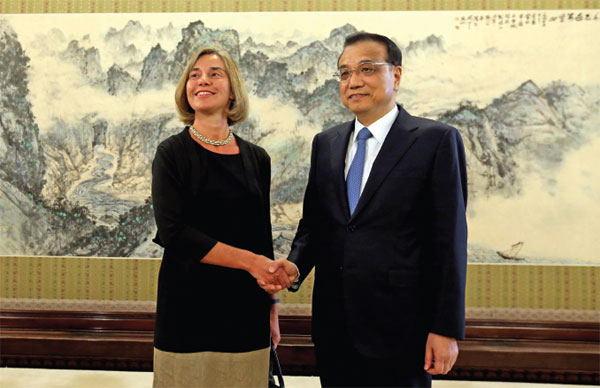China-EU meeting to boost relations

Premier Li Keqiang greets Federica Mogherini, the European Union's high representative for foreign affairs and security policy, before their meeting at the Zhongnanhai leadership compound in Beijing on April 18. Feng Yongbin / China Daily
Premier Li Keqiang will visit Germany and Belgium for the annual EU-China leaders' meeting from May 30 to June 2. It has been a hectic period of diplomatic activity for the European Union. On Thursday, US President Donald Trump visited the EU headquarters in Brussels and over the weekend EU leaders will take part in the G7 summit in Italy.
As Li will have experienced in his talks with German Chancellor Angela Merkel, the EU is in a more confident mood than six months ago. The defeat of populist leaders in the French and Dutch elections, and the expected victory of Merkel in the German elections in September have changed the political outlook in the EU.
Brexit remains a problem but no other EU member state is talking about leaving the bloc. On the contrary, Brexit and Trump's election as US president seem to have brought the remaining 27 EU member states closer. And while Merkel and newly elected French President Emmanuel Macron are expected to agree policies later this year to deepen the integration process, the EU economy is recovering faster with growth expected to reach 1.5 percent this year.
Another byproduct of the changed international environment is a closer alignment between the EU and China on many issues. When senior officials from both sides recently reviewed progress toward the EU-China agenda 2030, there was a remarkable degree of progress to report.
Brussels and Beijing have emerged as the two most important defenders of the multilateral system, especially on free trade and the Paris climate agreement. At their meeting, EU and Chinese leaders will discuss how to deepen cooperation in the run-up to the G20 meeting in Germany in July. This will also be a major theme of the Li-Merkel talks in Germany.
The EU also looks forward to working with China on a growing Asia-Europe Meeting agenda.
On trade and investment there is a large measure of agreement but also some problem areas. But both sides are committed to concluding the negotiations on a bilateral investment treaty as soon as possible.
The EU remains supportive of the Belt and Road Initiative and will look to develop new projects through the connectivity platform. But as European Commission Vice-President Jyrki Katainen said in Beijing recently, EU support will depend on the initiative meeting the highest international standards in transparency, procurement and social and environmental sustainability.
The problem areas relate to market economy status for China and market access for EU enterprises in China. China believes the EU should recognize it as a market economy automatically as it was enshrined in its World Trade Organization accession protocol. And the EU argues China is still not a market economy as much of its industry and most banks are under State control.
Besides, Brussels is preparing new trade defense legislation which it claims is not targeted against any country.
And while Brussels complains that China does not offer a level playing field and that EU companies face unfair discrimination in trying to enter the Chinese market, Beijing points to the large profits European companies make in China. But these are unlikely to derail a meeting which seems destined to further boost EU-China relations.
The author Fraser Cameron is the director of the EU-Asia Centre in Brussels.
- Back _articles: Premier Li's visit to inject impetus to China-Europe ties
- Next _articles: Chinese premier and German vice-chancellor stress value of bilateral ties